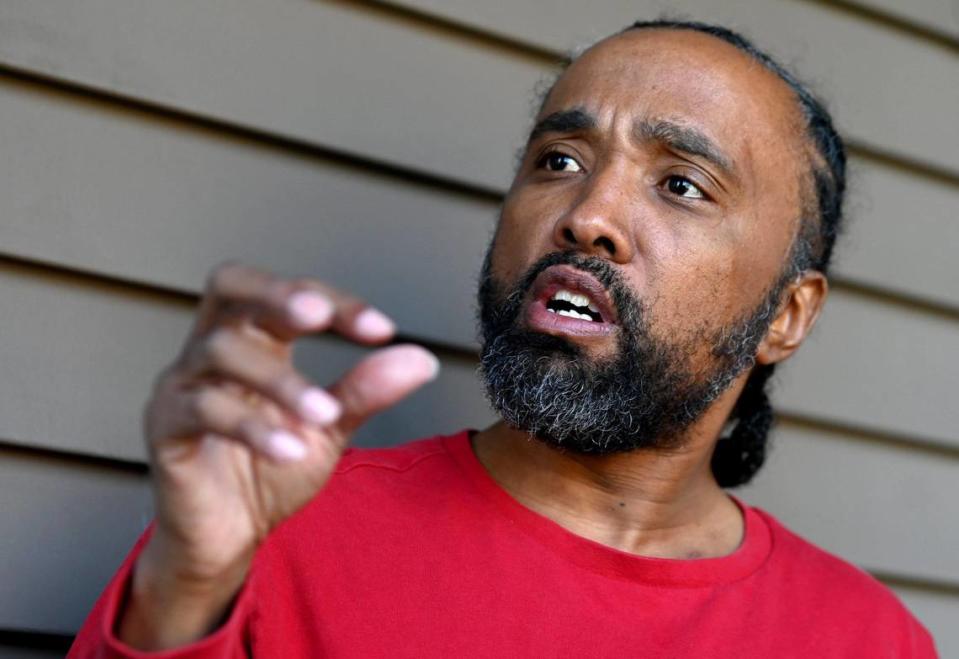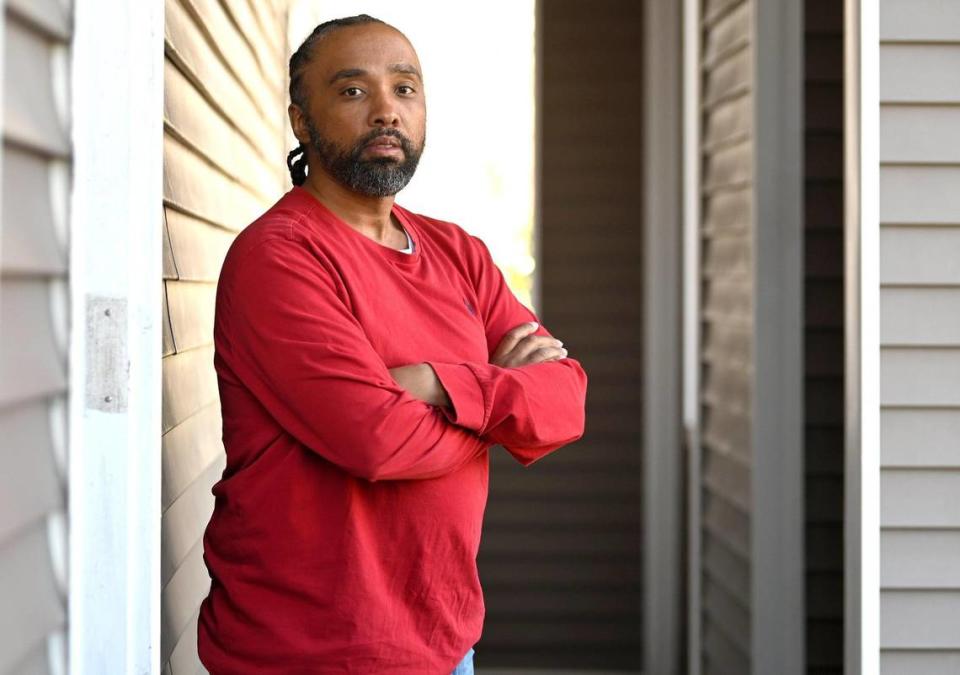Mecklenburg inmate posted bond but stayed in jail. NC’s new court system says it’s not to blame
Charged with a probation violation, Conrad Burke waited in the Mecklenburg County jail on Oct. 27, his body hurting and his frustration growing. His wife and mother were worried.
Burke, who is 45 and lives in Charlotte, thought he’d met the requirements to go home.
Court and jail records say he posted bond about 20 hours before his release.
“What’s going on?” he recalled. “Why am I still here?”
Burke and his lawyer believe the answer is tied to eCourts, a new records and case management system that launched in Charlotte two weeks before the late check-out.
Burke is one of “many” people who spent extra time in jail as the sheriff’s office and courthouse adjusted to the new system, attorney Zack Ezor said. Those late check-outs have taken a couple hours to a couple days, he said.
The Mecklenburg County Sheriff’s Office said Burke’s delay in getting out came from something simpler. They were waiting to learn whether he needed to wear an electronic monitor, spokesperson Bradley Smith said.
The state office responsible for eCourts said there were no software errors in Burke’s case.
‘Days, hours of life taken away’

ECourts — a $100 million project overseen by the North Carolina Administrative Office of the Courts — is moving the state’s courthouses into the modern era. In Charlotte, Raleigh and other cities, records are online and free to read. Lawyers, clerks and judges do much of their work from computers now, instead of sifting through folders and papers.
But a federal lawsuit says the eCourts rollout led to “hundreds” of people being unlawfully detained. Some people say they were arrested multiple times on the same warrants. Others, including Burke, say they were locked up for hours or days after they met the criteria to go home.
In just four days in October, more than 60 people in Mecklenburg County were “detained well beyond the point their conditions of release were satisfied,” the suit says.
The criminal justice system doesn’t always move quickly.
“There are some instances where it’s understandable. An investigation has to be conducted, you’re waiting for the court’s trial schedule to open up,” said Ezor. “That is just a facet of the system that people acknowledge. We’re always trying to do our best with it.”
But keeping someone in jail long after they’re free to go home?
“Days or hours of your life are taken away from you after everyone involved acknowledges that you should be out,” he said. That’s time away from work, family and friends, he said. Days scratched off calendars.
Did eCourts keep man in Charlotte jail?

After a two-day back-and-forth, the office overseeing eCourts gave a one-sentence response to questions for this story.
“The NCAOC reviewed the case and did not identify an eCourts software error,” spokesperson Graham Wilson said.
Wilson did not make any NCAOC staff available for an interview. For months, the Observer and Raleigh News & Observer have asked to speak to state staffers, but only received statements denying eCourts’ software played a role in unlawful arrests and detentions.
The NCAOC’s own reports show eCourts failed to complete more than 500 processes in just 12 days in October, the Observer reported earlier this month. Those errors don’t produce extra jail time or unlawful arrests by default, but they do mean someone needed to make changes to records manually.
From Oct. 9 — the day it launched in Charlotte — to Nov. 4, magistrates were responsible for collecting inmates’ signatures for “appearance bonds” before they could be released, sheriff’s office spokesperson Bradley Smith said when asked about Burke’s extra jail time. It was a built-in part of the rollout, and it only required inmates to sign out before leaving.
A timeline Smith provided shows Burke wasn’t able to sign until 10:46 a.m. on Oct. 27, more than a day after he arrived at arrest processing, which is the first stop when someone goes to jail.
The wait didn’t stem from eCourts or the new process, Smith said. It was more straightforward.
“In this particular case, the major part of the delay was waiting on Probation,” Smith said. “The magistrate would not have called him to sign the appearance bond until we knew he was clear to leave. He was not clear to leave until Probation confirmed whether or not they were putting a monitor on him.”
The office was closed, and jail staff didn’t know whether Burke needed a monitor, Smith said.
Mecklenburg sheriff called family

Burke’s frustration built up. Born with a degenerative disc, he’s supposed to take medicine for chronic pain three times a day, he told the Observer.
“Arthritis, I’ve got all that,” he said. “I don’t even know the difference between the arthritis and the chronic pain I deal with. It’s all combined.”
He asked for his medicine while in jail, he said, but was told that he’d need to see a physician first — even though he had a prescription. Jail medical provider Wellpath told the Observer that it won’t comment on patients.
His wife grew anxious as he went without the medicine, she said.
In an Oct. 27 email to Sheriff Garry McFadden, she shared what had happened so far: Her husband posted bond the day before, but he was still in the jail, and he hadn’t been taken to the courthouse or released.

“He is being denied special accommodations for his disabilities, such as his medical devices and medications,” she added. “We would greatly appreciate your prompt attention to having this matter investigated immediately.”
Soon after, McFadden called her. By her account, the sheriff was sympathetic.
“He basically said that they had a new system, that he was apologetic and that my husband would be released soon,” Monica Burke said. The jail released him soon after.
The sheriff’s office confirmed McFadden spoke with her, but said it had been too long to recall what was discussed.
Who will take responsibility?
The lawsuit over eCourts has led to finger-pointing, including from the company that built the software, Tyler Technologies.
But any allegations that North Carolina sheriffs were responsible for “customs, policies or practices” related to eCourts’ adoption “has stretched plausibility to the breaking point,” Wake County Sheriff Willie Rowe said in a September memorandum.
McFadden’s call stood out to Ezor.
“There’s extreme reluctance in all of this for anybody to take responsibility,” the attorney said. “I’m sure (McFadden’s) lawyers would say this is not an admission of responsibility. But he seems to be on the right side of this, at least in terms of having some empathy.”
Before the software came to Charlotte, the sheriff expressed concerns to others in the criminal justice system about his staff using the system, the complaint says. And prior to being sued, the sheriff — known for speaking his mind — was not shy about those concerns. He said eCourts might even be a threat to public safety.
“We are all concerned,” he told WCNC before the launch, in September. “We are very much concerned. Who’s going to suffer is the public.”
Concerned as he was, he carried on without a fail-safe and dozens spent undue time in jail, the complaint says.
McFadden’s phone call with Monica Burke and any other calls like it could be evidence in the lawsuit.
‘Fall through the cracks’

No one told Burke about a “glitch” or any software issues while he was in the jail, he said. He had been arguing with guards over an ankle monitor, he said.
But he learned more about the state’s “new system” when he started searching around online, found out there was a lawsuit and contacted Ezor. Others said they were needlessly kept in the jail, he learned.
Burke is part of that lawsuit now, Ezor said. It remains to be seen whether a judge will allow him to be added as a plaintiff.
Regardless, Burke is one of the 60-plus people who spent extra time in the county jail after the rollout, the attorney said. His story will help the argument, Ezor said.
“You’ve got some people probably still down there right now going through it, but are unable to have somebody advocate for them,” Burke said. “They just fall through the cracks. That allows the eCourts system to keep going… It goes unnoticed, uncorrected.”
He’s hoping joining the suit will keep the system in check.
ECourts is live in 17 counties. It will expand to 10 more next month.

